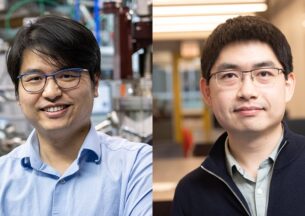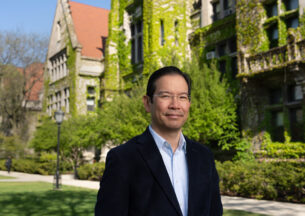UChicago CS Alums Go On To Exciting Futures in Academia, Industry, and Startups
As the Department of Computer Science has grown in recent years, so too has the community of UChicago CS alumni, expanding into new destinations in academia and industry. After completing their PhD or postdoctoral work at UChicago, our alums have gone on to faculty and postdoctoral positions at universities around the United States, have founded innovative new startups, and joined global tech giants on their most ambitious research teams. We spoke to several recent departures about their current work, their experience in Hyde Park, and their advice for the next generations of UChicago computer scientists.
Faculty and Postdocs
At universities such as UC Berkeley, Michigan, and Carnegie Mellon, UChicago CS alums have leapt into academia with prestigious faculty and postdoc positions. These early-career scientists are putting their UChicago CS experience to work on research and teaching in areas such as data science, programming language design, machine learning, and databases.

Roselyne Tchoua, an assistant professor in the School of Computing at DePaul University in the College of Computing and Digital Media, finished her PhD under advisor Ian Foster in August 2019. At DePaul, she leads courses in Fundamentals of Data Science and Programming Machine Learning Applications, researches human-in-the-loop machine learning approaches, and mentors undergraduate and master’s students.
“When I think back about my experience at UChicago, it may sound cliché, but the most valuable part of it was working with excellent researchers who help shape my critical thinking,” Tchoua said. “My advisors and professors taught me how to be critical of other works, how to digest constructive criticism of my own work and transform this knowledge into new research problems and solutions.”

Gregory Ongie and Cyrus Omar also recently began tenure-track positions, at Marquette University and University of Michigan, respectively. Ongie, who worked as postdoctoral researcher with Professor Rebecca Willett, said he appreciated the close-knit community and cross-disciplinary focus of UChicago, working with researchers from Applied Math, Statistics, Radiology, the Booth School of Business, and the Toyota Technical Institute of Chicago during his two years in the department. Omar continues to study tools and techniques that make programming more accessible, work started as a postdoc with Assistant Professor Ravi Chugh.
“I watched UChicago CS expand quite a lot during those two years as it also had an eye on the future of computing, so I thought it was a great forward-looking environment for the kind of work I like to do,” Omar said. “Beyond Ravi, there were many other faculty and students that I really enjoyed getting to know, and the culture in the department was very positive and social.”

Recently-graduated PhD students Huaicheng Li and Dixin Tang have both started postdoc positions with leading computer science research groups. Li moved from studying with Associate Professor Haryadi Gunawi to the Parallel Data Lab at Carnegie Mellon University, where he works with CMU faculty and students on system support for emerging applications. Tang joined RISELab at UC Berkeley, working with Aditya Parameswaran on new data science tools for people inexperienced with programming. He credits his UChicago advisor, Assistant Professor Aaron Elmore, as well as Liew Family Chairman Michael Franklin and Assistant Professor Sanjay Krishnan with building the skills and connections to reach his current role.
“UChicago CS has many fantastic professors in different areas,” Tang said. “It opens a lot of collaborating opportunities.”
Industry & Startups
Several UChicago CS alumni have also made the leap into industry, joining leading technology companies such as Apple or Amazon, or bringing technical expertise to companies such as Citadel and HRL Laboratories. Others have started their own businesses using talents acquired in the department, facilitated by the University’s entrepreneurial resources and networks. These transitions from academia to industry have been smooth, the researchers said, due to the advanced, in-demand skills they picked up during their time at UChicago CS.

“I wasn't sure if I wanted to end-up in academia or industry when I was starting my PhD,” said Kavon Farvardin, who works at Apple as a Swift Compiler Engineer after studying with Professor John Reppy. “I focused on applied research that involved writing software and using popular technologies. Thus, while completing my PhD, I also sharpened skills that are highly valued within the industry.”
Those acquired skills also led Citadel, a Chicago financial services firm, to hire Guangpu Li as a technology researcher. Li, who was advised by Professor Shan Lu, helps the company build faster computer systems to navigate the rapidly-shifting world of financial markets.
The tech industry is eager to work with graduating students that have experience in nascent CS topics such as quantum computing, a strong and growing research area at UChicago CS. Adam Holmes, a PhD graduate advised by Professor Fred Chong, moved to HRL Laboratories, where works on quantum information theory and quantum simulation. Yunong Shi, also a graduate from Chong’s research group, took a position as a quantum research scientist at Amazon, researching near-term quantum algorithms, languages, compilation, and error mitigation for the company’s quantum cloud service, Braket.

The UChicago CS experience has also inspired the creation of startup businesses bringing these new concepts to market. Pranav Gokhale, another alumnus of Chong’s group, started his own company in the quantum space: Super.tech, a software startup building a technology stack to help quantum computers solve commercially useful problems.
“UChicago CS equipped me with the research skills and quantum background needed to start Super.tech,” Gokhale said. “I routinely recall techniques from all three branches of the core curriculum — systems, machine learning, and theory. And of course, the research skills I developed in Professor Chong's laboratory are critical for my day-to-day work in quantum computing.”

Another startup company with UChicago CS origins is Tharzen, co-founded by Mikaël Mayer, and Booth School of Business MBA student Aseem Bhardwaj, which offers a content management system that makes it easier for businesses to edit their own websites without deep technical expertise. The company and its product grew from Mayer’s research with Chugh, and the connections between UChicago CS and the Polsky Center for Entrepreneurship and Innovation helped bring the work from lab to market.
“Working for Tharzen was compatible with my postdoc, because I was building up use cases and applying the latest of my techniques on the HTML, JavaScript and PHP programming languages, so that we can obtain inline or live editing on an otherwise “locked” websites,” Mayer said. “On my journey to entrepreneurship, I was very happy to find an ecosystem and supportive people — I owe to a Polsky spreadsheet the greatness of meeting my business associate.”
Advice for the Next Generation
From the vantage point of their new positions, UChicago CS alumni looked back to offer advice to current or prospective PhD students. Many credited the growth of the department during their time in Hyde Park as opening up new avenues for their subsequent career moves, and encouraged students to take advantage of the bridges between computer science and other departments on campus.
“Go to colloquiums! Especially the job talks,” Ongie said. “UChicago attracts some of the top candidates in the field, and attending their talks is an incredibly useful way to learn not only about state-of-the-art research, but also how to give a good job talk yourself.”

“The department is expanding and finding its way to one of the best CS departments in the U.S.,” Shi said. “Many young and talented assistant professors were recruited in recent years. I would recommend the CS department to any incoming students looking for a young and vibrant environment to study computer science. My advice for incoming students is, ‘stay foolish and stay hungry.’”
“I would recommend UChicago because the environment calls for excellence,” Tchoua said. “It will challenge you, but you will come out on the other end, feeling wiser, stronger and proud. I would give graduate students or postdocs the advice that stuck with me as I was embarking in my own adventure: if the thought of joining UChicago’s research environment excites you and terrifies you at the same time, go for it. You will learn to transform challenges into wonderful opportunities.”
You can find more information about graduate programs at UChicago CS, and fill out an application by December 15th here. UChicago CS does not require the GRE exam for the 2020-2021 PhD application cycle.













